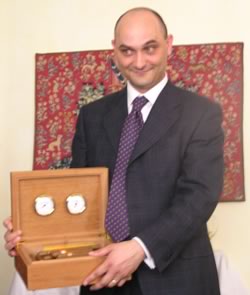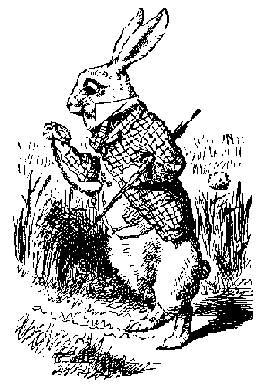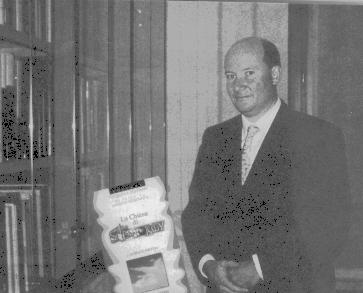Miguel Martinez April 12 2001
I recently wrote a critical comment about him which, it turns out, was based on a completely false premise. In this article, I propose to investigate what happened. Unfortunately, there is a good deal of detail which must be gone into, and I take it for granted that readers will already know the basic issues involved (I have taken the article off line so people looking for "Hadden" on search engines will not chance on it; but since I have no intention of covering up my mistakes, anybody who wishes to read it may write to me to ask for a copy).
The CESNUR web site has published an article by PierLuigi Zoccatelli. Zoccatelli, formerly a Crowleyite rock musician, later converted to a fundamentalist version of Catholicism and is now a member of CESNUR and militant of the right-wing association Alleanza Cattolica.
The article appears as a "short review" of the book, Religion on the Internet: Research Prospects and Promises, edited by Jeffrey K. Hadden and Douglas E. Cowan (Amsterdam, London and New York: JAI, 2000). The title of Zoccatelli's article is "Anti-Cult Terrorism via the Internet Revisited"; titles of reviews are usually supposed to give an idea of the contents of the book being reviewed. Most of the review is devoted to the fourth section of the book, which analyzes "cult wars on the web". Zoccatelli describes Massimo Introvigne's paper in the book on "Anti-Cult Terrorism Via the Internet", and then quotes Hadden's comments on the article. The paragraph quoting Hadden's comments moves on to say that the fact that certain people complained of being called terrorists proves that they are terrorists.
This statement, which is demonstrably ridiculous even before being false, is what I criticized Prof. Hadden for. My criticism was based on the mistaken assumption that a relation existed between the contents of the review by Zoccatelli and the book Zoccatelli was purportedly reviewing.
Actually, there is very little relation indeed between the two.
Hadden of course did write some of the words Zoccatelli quotes as his; however the words are taken entirely out of context.
Actually, the quotes are taken from the introduction to the book, signed by both Hadden and Douglas E. Cowan, whom Zoccatelli for some reason does not even mention in this part of his review. It is important to understand that this is not Hadden's essay (Hadden has an article in the book, "Confessions of a Recovering Technophobe: A Brief History of the Religious Movements Homepage Project", which has nothing whatsoever to do with "Internet terrorism", and is in fact quite interesting). It is simply a neutral presentation of the contents of the book. The introduction covers 25 pages; on page 19 we find ten lines devoted to a summary of Introvigne's essay, about the same amount of lines that are devoted to each essay. The summary merely repeats Introvigne's abstract almost word by word, which is what Hadden and Cowan do with every other essay.
 PierLuigi Zoccatelli presents his book, Habanos. Guida completa al sigaro cubano Zoccatelli's Missing Label Let us compare the following three sentences. To clearly understand how misleading Zoccatelli's words are, I have used three different colours throughout this article for the actual words written by each author: blue for Introvigne's article, green for other articles from the same book, red for Zoccatelli's review.
In this way, Hadden's (and/or Cowan's) emotionally detached quotations from Introvigne are turned into Hadden's personal opinion, and this non-existent personal opinion is in its turn exploited to legitimize Introvigne's bizarre essay. Notice also that Zoccatelli puts the words "Anti-Cult terrorists via the Internet" between quotes. Hadden never uses this expression: the nearest he gets to it is quoting the title of Introvigne's essay.
But Zoccatelli carefully avoids quoting the key expression used by Hadden, at the very beginning of the whole paragraph:
Labelling…
In all the 365 pages of the book, nothing resembling this statement appears. It is entirely the invention of PierLuigi Zoccatelli. As is the theory that if you object to people calling you a terrorist, it means you are a terrorist. This is what I based my criticism of Prof Hadden on.
Prof. Hadden is of course responsible for not having objected to Introvigne's study being included in a collection of otherwise serious papers. But he is not guilty of having in any way publicly espoused Introvigne's idiosyncratic theory. Let alone for having added this weird twist to it.
Zoccatelli's words make it look however as though he did. And his remarks also include an extraordinary collection of mistakes:
The methodology employed by Massimo Introvigne to label nine websites as "terrorists", eight of which had at some time or another disagreed with him, was thoroughly discussed in my essay on his original article and in another on an article published in Terrorism and Political Violence. I have no idea whether Zoccatelli understood my critique; he certainly does not discuss it.
Introvigne's article does however pose several problems for anyone trying to "discuss" it. Much of what he says is only intelligible in the context of Introvigne's personal polemics. For example, Introvigne writes "when dealing with the printed media, we realize that The New York Times is not infallible, but is in any case more reliable than the Weekly World News". This in itself is so obvious that discussing the "methodological issue involved" would simply be a waste of time; but the whole point of Introvigne's study is trying to establish a parallel between anybody who has a different opinion from his own and the Weekly World News; in order to prove implicitly that his own website is the New York Times of "cult" issues. To do so, he presents evidence which is so biased as to falsify the whole issue.
The question of "anti-cult terrorism on Internet" is closely parallel to that of talking rabbits. Before discussing why and how rabbits talk, one must first see whether any evidence exists that they actually do.
This is why analysis of the evidence should come before any analysis of the conclusions. And the evidence shows that there are about as many valid reasons for believing in the existence of "anti-cult terrorists on Internet" as for believing in the existence of garrulous rodents.
 The reaction that never was Zoccatelli writes:
Did they? Let us see how each individual/site accused of being a "terrorist" actually reacted.
None of those who did react - as far as I know - ever accused anybody but Introvigne of labelling them as "terrorists". The reason for Introvigne's accusation of "terrorism" was so obviously personal that it was quite clear that other "cult apologists" (who might be criticized for other reasons) had nothing to do with it.
I wrongly suspected Hadden of having joined company with Introvigne on this issue, however only because Zoccatelli quoted him as agreeing. Zoccatelli's words "presumably Hadden, and other 'cult apologists'" are therefore entirely inappropriate.
The expression "cult apologists' conspiracy" is put between quotes. I am unaware whom Zoccatelli is quoting: I know of no critic who ever spoke of such a "conspiracy."
Another statement which is easily demolished. As we already saw, most of the websites accused never reacted in any way or made any claims whatsoever. But whether they reacted or not, what about the idea that such sites are or are not "anti-cult"?
Some time ago, Hadden helped Scientology earn a few million dollars by saying that the multinational's copyrighted package of expensive courses were "esoteric knowledge", quoting such precedents as the Ancient Egyptians (although they lived many centuries before patent lawyers).
As far as I am concerned, I find it hard to respect Hadden's decision to testify in defence of the right of Scientology to keep its consumers unaware of what they are being pressed to buy. I would be equally critical if Hadden had done the same for a car manufacturer.
However, there are at least two reasons why I am much less interested in Hadden than in Introvigne.
First of all, it was Introvigne and not Hadden who made false accusations against me originally, flooded Usenet with insults, threatened my provider into closing my website and then called me a "terrorist."
Second, there is a major difference between Introvigne and Hadden. Hadden is not one of the five national leaders of an extremist organization which defends the Inquisition, is apologetic of the violence exerted by Brazilian landowners, pressures political parties to take a stand against Islam and denies homosexuals and other minorities their rights. If Hadden wants to get into my firing line, he will have to work hard.
This fantastic use of the words "hate literature" and "terrorism" to describe the presentation of documents on the activities of certain organizations and businesses, I suppose is not "name calling".
The reference to "law enforcement agencies and lawyers" is of course part of CESNUR's typical way of making indirect threats; or else just wishful thinking. I realize that shutting people up who disagree would simplify CESNUR's life. However, we do not yet live under the "counter-revolutionary dictatorship" which Plinio Corrêa de Oliveira - the spiritual guide of Introvigne and Zoccatelli - hoped would save us from social equality, freedom of speech, heretical doctrine and other ills. Such a dictatorship, he wrote in Revolution and Counter-Revolution
However, Zoccatelli for once is right in saying that "Religion on the Internet' is, of course, about much more than cult wars and anti-cult terrorists". In fact, well over 90% of the book has nothing to do with Introvigne's private problem.
For example, reading Jean-François Mayer's essay on "Religious Movements and the Internet: The New Frontiers of Cult Controversies", I had the pleasant surprise of discovering information and opinions - from this member of the CESNUR board - which were both interesting and original.
Some of the other essays are perhaps a little timid - many scholars in this field seem to see the groups they study as a garden to be carefully tended, which has to yield an annual crop of books and articles for them, and research jobs for their students; excessive zeal in trying to understand what makes their subject matter tick could easily lead to the group losing its willingness to be studied. As a result, several authors - unlike Mayer - seem to indulge in a good deal of taxonomy, which never offends anybody and does show that the writer is earning his keep as an academic.
However, nothing in the book remotely resembles Introvigne's essay, which sticks out like a sore thumb.
 Zoccatelli in the "Name calling arena" One essay in the book - one of the best, by the way - is misrepresented by Zoccatelli. Here is how he describes it. He says readers will be
The actual essay is far more objective. First of all, it touches on many issues, "anti-cultists" being only one of them. Cowan never employs the term "name-calling arena", which is basically silly: people like me who followed NUREL know it never became one. Here for example is how Cowan recounts the conflict:
Zoccatelli's claim that the problem was "non academic anti-cultists" hardly fits in with his following statement, that restricting the list to scholars (and hence excluding what Zoccatelli had just described as the problem) "did not solve the problem."
What Cowan actually says is quite different. First, he stresses that the hot issue was specifically Scientology, and hence not "anti-cultists" vs. "cults" in general (by the way, Irving does say that the Scientologists were "respectful and polite"; but this is not a comparative statement, as would appear in Zoccatelli's version). The decision to ban discussion of this controversial issue quite naturally led to loss of general interest; and the final blow to traffic on the list came when the list was moved over to a Majordomo server requiring academic membership for admission (the decision was not taken by Hexham, but by the University listserv).
Although this probably makes me a loser in the short run, there is an important reason for this. Most people would probably dismiss deliberately misleading statements and loaded language like Zoccatelli's and Introvigne's (remember the latter used the word "extremist" to describe his critics no less than thirty-two times in one article) as not worth replying to.
Instead, I analyze every paragraph of what Zoccatelli writes and plod through the logic of it all. This is simply because I believe in discussion. I also believe in apologizing when making mistakes. Although Zoccatelli's words certainly would induce anyone into error, I certainly should have waited to check how reliable his article was before accusing Prof. Hadden.
This is not necessarily just an ethical issue. Introvigne - whom the daily La Stampa has listed as one of the ten richest men in the very affluent city of Turin - can count on an important organization like Alleanza Cattolica, on taxpayers' funds and political alliances around the world. In a world where not so many people have access to Internet yet, CESNUR can count on a near-monopoly of written media. I can count on a computer and a few friends.
This means I have to rely on less visible resources. For example, both CESNUR and I make mistakes. However, the Internet public is becoming increasingly aware that CESNUR never admits its mistakes. The same public is also aware that I do admit mine. And correct them.
The Internet public is becoming increasingly aware that CESNUR replies to its critics by applying labels such as "lunatic fringe", "terrorism" or "hate literature", without discussing the contents of the criticism. The same public is also aware that I quote whole paragraphs of the articles I criticize, so the reader can always understand the context and what I am discussing.
In other words, to compete with CESNUR I have to be boring. I have to admit my mistakes. Honesty, in my case, is certainly the best policy.
|